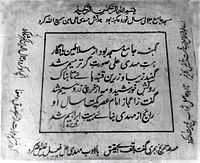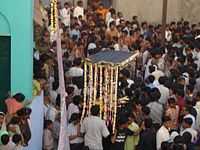Jalali, India
| Jalali, India Jalali | |
|---|---|
| town | |
 Jalali, India Location in Uttar Pradesh, India | |
| Coordinates: 27°52′N 78°16′E / 27.87°N 78.27°ECoordinates: 27°52′N 78°16′E / 27.87°N 78.27°E | |
| Country |
|
| State | Uttar Pradesh |
| District | Aligarh |
| Elevation | 178 m (584 ft) |
| Population (2001) | |
| • Total | 17,451 |
| Languages | |
| • Official | Hindi |
| Time zone | IST (UTC+5:30) |
Jalali is a town and a nagar panchayat in Aligarh district in the Indian state of Uttar Pradesh.
Geography
Jalali is located at 27°52′N 78°16′E / 27.87°N 78.27°E.[1] It has an average elevation of 178 metres (583 feet).
History
Jalali is a historical town located in the district of Aligarh and is known for its culture and traditions. Formerly known as Nilavati, Jalali was founded by Jalaluddin Khilji during the reign of Ghiyas ud-din Balban[2]
One of the oldest inhabited sites in the district of Aligarh, Jalali has also been a perfect example of communal harmony for decades. Jalali was under the influence of both Mughals and Britishers. Its history can be traced back to 16th century when Syeds migrated from Hamdan in Iran and settled down here. They are descendants of Shah-e-Hamdan Syed Ali Hamdani, an Islamic scholar and sufi saint. Syeds in Jalali lived as landlords and had reasonably good education. Jalali also has a few good examples of old Mughal architecture. Jalali has been an active contributor in the development of Urdu language. It produced a poet of international fame Ustad Qamar Jalalvi . Some other well-known poets of Urdu who emerged from Jalali are Mohabbat Jalalvi, Peer Mohammad Gauhar Jalalvi, S.Shabber Husain Saher Jalalvi, S.Sajjad Hussain Hadaf Jalalvi, S. Ali Baqar Chacha Jalalvi (known for his humorous poems) and S. Afsar Ali Baqa Jalalvi. Baqa Jalalvi one of the greatest poet wrote some marsiyas, nauhas and salams. His most well known marsiya is "Uffaqe shaam se utthi jo ghata zulmat ki". His father Sayyed Zille Hussain Fiza wrote a well-known marsiya "Andaleebe gule gulzaar risalat hun mein". He also edited famous salam composed by Dilgeer "Hai salaam us per jo baikas be padar be yaar tha".
Jalali has many imambaras and mosques. One of the finest imambaras in Jalali is the Imambara of S.Farzand Ali which is over two hundred years old. It is an imposing structure with a mosque inside. It can accommodate more than five thousand persons at a time in addition to women and children who gather on the terrace of the imambara and the mosque in large numbers on 9th of Maharram and on the occasion of Chhelum. Another Imambara called Bara Imambra situated in mohalla Garhi is also very old. A huge 'alam' of Hazrat Abbas called ' Fateh Nishan' is hoisted on the courtyard of this imambara in the morning of 'yome aashura'. The 'Aashura' procession that comprises Alam, Tazia, Tabut and Zuljinah is finally brought to an end in this imambara.

An important landmark in Jalali is the historic Jama Masjid. It was built by Sultan Ghiyasuddin Balban and is over seven hundred years old. The Masjid bears an inscription with the name of Balban dated 665 Hijri or 1267 AD. The mosque is well maintained and is looked after by a trustee appointed by Shia Waqf Board, Lucknow. The photograph of the mosque and its brief history along with the inscriptions of Sultan Balban, Mohammad Shah and Jalaluddin Akbar was published in the Archaeological Survey of India, 1936. The mosque was renovated and rebuilt by Haji Syed Mehdi Ali of Jalali in 1901. The original mosque had one dome. Two more domes were built by Haji Mehdi Ali who also added a golden kalas on top of each dome. An account of the contributions of Haji Mehdi Ali is engraved in Persian on the marble stone which forms part of the middle arch of the mosque.

Jalali is also famous for its fertile agricultural lands. The name of Jalali was mentioned by Ibn Battuta in one of his famous travelogues, Rihla. It is also known by the name of S. Mohammad Husain Qamar Jalalvi, who paid a tribute to Jalali in one of his couplets,
- "Her sans ghaneemat hey mera ahl-e-watan ko / Duniya mein Jalali Ki hawa bandh raha hun". (All India Mushaira at Aligarh in 1954)
References
- ↑ Falling Rain Genomics, Inc - Jalali
- ↑ Aligarh Gazetteer, Lucknow, Volume 6, 1926.